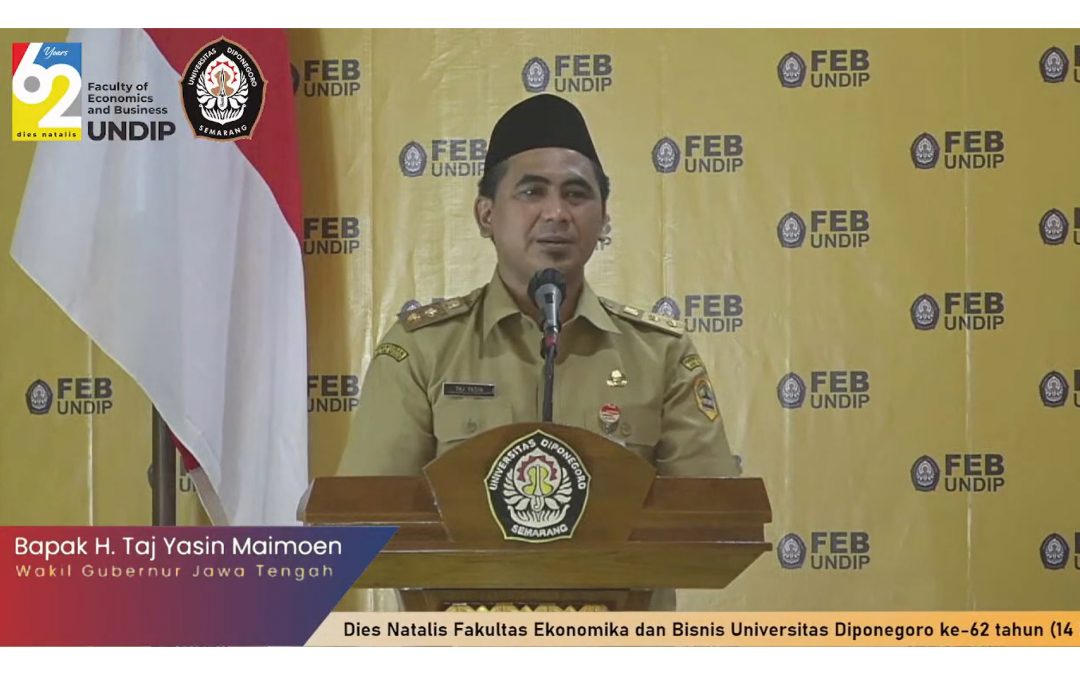In commemoration of its 62nd Anniversary, the Faculty of Economics and Business (FEB), Diponegoro University (Undip) successfully held an Open Senate Meeting and Scientific Oration with the theme “Strategy for Strengthening MSMEs and Cooperatives in the Pandemic Era as the Economic Backbone of Central Java”, on Monday (14/03) at 09.00 AM. The event was held offline at the FEB Entrepreneurship Building Hall, Undip Tembalang campus and online through the Zoom meeting platform.
The event was attended by the Undip Rector, Vice Rectors, Chair of the Undip Academic Senate, Chair of the Board of Trustees, Dean of Faculty of Economics and Business, Chair of the FEB Academic Senate, Deputy Deans, Heads of Departments, Head of Study Programs and Secretary of Study Programs in FEB, as well as Deans and Deputy Deans in Undip . They also invited Deputy Governor of Central Java, H. Taj Yasin Maimoen; Leaders of FEB Undip Partner Banks; Chair of IKAFE Undip, and Alumni of FEB Undip.
In his speech, Undip Rector, Prof. Dr. Yos Johan Utama, S.H., M.Hum., congratulated the Undip Faculty of Economics and Business on the 62nd Anniversary. “I congratulate the Anniversary of FEB and let us unite to improve the quality of FEB Undip. Insyaallah, this will also have an impact on improving welfare,” he said.
Prof. Yos revealed that FEB Undip has graduated many great alumni who are beneficial to the community and have been internationally recognized. “FEB Undip from the early 60s until now has produced many people who are very useful for Indonesian citizens and even mankind in the world. FEB Undip has produced a wide variety of renewable knowledge. This achievement has been recognized by the world, it is proven that study programs at FEB Undip have been internationally accredited by FIBAA, and I am sure it will continue to improve,” he explained.
Furthermore, Prof. Yos advised to continue to prioritize integrity in facing every challenge. “We prioritize integrity every time we face such things. It will set or direct our intentions. Integrity will direct us, direct our rights and powers, also direct our goals and the ways in which those goals will be achieved,” concluded Prof. Yos.
“My best prayer for FEB Undip and the academic community of FEB Undip, hope that in the future FEB Undip will be a bright light in the field of economics and business, not only at the national and regional level but also at the international level. I hope FEB Undip can continue to produce excellent graduates who can become role models in every activity that has high integrity,” continued Prof. Yos.
In his presentation, the Deputy Governor of Central Java, H. Taj Yasin Maimoen conveyed the Strategy for Strengthening MSMEs and Cooperatives in the Pandemic Era as the Economic Backbone of Central Java. “MSMEs are one of the biggest supporters of economic growth during the Covid-19 pandemic,” Taj Yasin explained.
Data from the Ministry of Cooperatives and MSMEs in 2021 recorded that the number of business sectors reached 64.19 million with a participation of 61.97% of GDP, which 8.6 trillion of it from MSMEs contributions to the Indonesian economy. These MSMEs can grow to absorb 97% of the total workforce and can also collect 60.4% of the total investment.
“Meanwhile in Central Java, in the 4th quarter of 2021 there were 173,431 MSMEs with details of employment as many as 1,331,015 people, which we know during the Covid-19 pandemic many people got laid off, but with the presence of MSMEs there is growth in energy absorption,” said Taj Yasin.
According to Taj Yasin, the existence of students who were still doing online learning in their respective regions was one of the driving forces for the rise of the regional economy. “With students, especially students who study vocational economics, of course they have different views so that in the end many training activities are initiated by students. I am sure in those activities there are also many Undip students majoring in economics participate in training the community. They educate the community how to manage something, how the packaging should be, and about a variety of things which have their own market share,” he explained.
On this basis, the government subsequently issued several policies to support the re-growth of MSMEs, including the National Economic Recovery (PEN) policy, providing grants for new entrepreneurs, increasing LPDB Cooperatives and MSME funds, and cheap loans for MSMEs through KUR credit. “Not only that, we are also preparing MSMEs to be able to compete in the domestic market and even to the international market and this is our challenge,” said Taj Yasin.
During the Covid-19 pandemic, Taj Yasin invited the public to change their mindset in viewing the pandemic as a disaster, but to make it a lesson for the community. The current home industry or MSMEs actors can compete with large industries by taking advantage of the international market.
Human resource development has also been carried out through various kinds of training and technical guidance. This is expected to increase the ability and knowledge of MSMEs actors related to product branding, making product designs, and promoting products with good storytelling.
“We also do virtual marketing through the UKM Virtual Expo or what we call UVO and cooperate with several e-commerce companies. From promotions through Gojek start-up, we can earn a turnover of 2.5 billion, besides UVO which can earn 4.8 billion. This means that these MSMEs actors, especially in Central Java, are actually ready, we just need to accompany them. We also have a marketplace that we call Sadewa Market for promoting Central Java MSMEs superior products,” Taj Yasin explained.
In addition to MSMEs, cooperatives are also one of the drivers of national development. In Indonesia, cooperatives have become important institutions and have a long history. The founding fathers of the nation had a strong belief that the Indonesian economy would progress if it was structured as a joint effort with the principle of kinship. This makes Cooperatives as an undeniable strategic partner of the government in strengthening the nation’s development to achieve community welfare.
“In Central Java as of 2021, the number of cooperatives reached 20,777 cooperatives, consisting of 10,770 inactive cooperatives and 10,000 active cooperatives with a turnover value of 54 trillion and a turnover of 47.3 trillion with approximately 7,999,000 members. This means that we also need to encourage cooperatives,” said Taj Yasin.
At the macro level, cooperatives can contribute to increasing GDP, creating jobs, reducing unemployment, maintaining price stability, and maintaining inflation, which in turn can help reduce poverty.
Furthermore, Taj Yasin advised the students to always think creatively in order to be able to open their own business opportunities. “We need young people, not just young people who study at the faculty to add their knowledge, but young people who have innovation and skills. I hope that FEB Undip will equip the students to be creative and innovative so that they can open up business opportunities,” concluded Taj Yasin.

